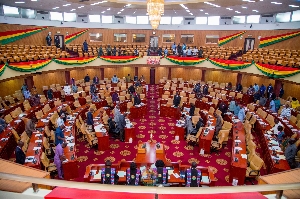A Senior Programmes Officer at the Center for Democratic Development-Ghana (CDD-Ghana), Michael Augustus Akagbor, is urging Parliament to adopt the concept of instrumental rationality in the consideration of the Promotion of Proper Human Sexual Rights and Ghanaian Family Value Bill, 2021, currently before the House.
Mr. Akagbor emphasized that the passage of such legislation should adhere to instrumental rationality, ensuring the protection of Human Rights as enshrined in chapter five of Ghana's 1992 Republican Constitution.
He stressed that personal emotions should not influence the decision-making process, as these laws impact a diverse spectrum of society.
During a two-day Engagement on Human Rights and a Rights-Based approach to Protecting, Respecting and Fulfilling the Rights of Sexual Minorities in Ghana at Ho in the Volta Region, Akagbor expressed concern about religious overtones influencing the parliamentary process.
He cautioned against the passage of the bill in its current state, highlighting potential violations not only against LGBTTQQIAAP+ members but also the broader Ghanaian population.
Akagbor voiced his opposition to the bill, citing its potential impact on various professions such as doctors, journalists, teachers, parents, and landlords, which he argued would violate fundamental human rights principles.
Mr. William Nyarko, the Executive Director of Africa Center for International Law and Accountability (ACILA), joined the conversation, stating that the bill infringes upon freedom of assembly, association, and other rights.
He criticized Parliament for seemingly undermining chapter five of the 1992 Constitution in its pursuit of passing the bill.
The call for instrumental rationality underscores the need for a balanced and rights-based approach in legislative decisions affecting a diverse society.
General News of Saturday, 17 February 2024
Source: starrfm.com.gh













